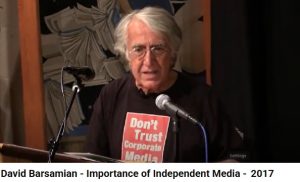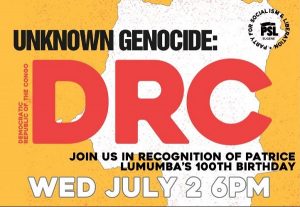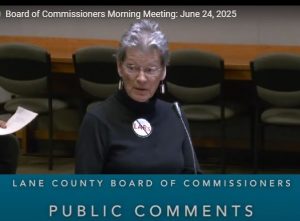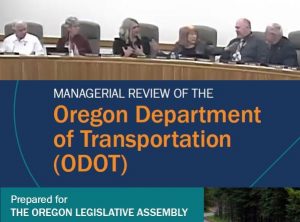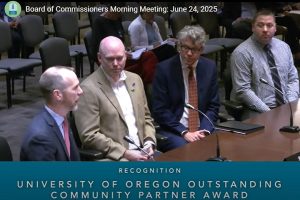Neurodivergent Art and Performance Expo coming to downtown Eugene May 30
9 min read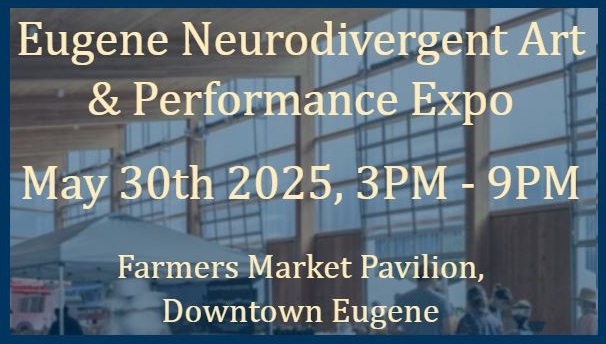
Presenter: Coming to the Farmers Market Pavilion May 30: The Eugene Neurodivergent Art and Performance Expo. Host of KEPW’s Underground Echo, Wednesdays at 6 p.m., Echo interviews event organizer Kevin Kopsco:
Kevin Kopsco: My name is Kevin Kopsco. I got a grant from the City of Eugene to put on this event, Eugene Neurodivergent Art and Performance Expo. It’s there to celebrate the arts and performance and culinary art and just to be able to broadcast it because through art is a very poignant way to capture the neurodivergent experience.
[00:00:32] My organization, I started it last year, it’s called Eugene Neurodivergent Support. I started this because with all the things going on, whether globally, nationally, or locally, with my autistic pattern recognition, I saw the writing on the wall and was like, ‘Wow, there aren’t very many safety nets for anybody.’ And they’re just dropping everywhere.
[00:00:55] So us being one of the most vulnerable populations, really need to stick together. So I did it out of that mentality. Also, because it’s hard to find neurodivergent community. We’re very scattered and hidden. So it’s been really helpful for me and for a lot of other people in the community who just didn’t realize that they were dealing with stuff in silence or coming to terms with new diagnoses and things like that.
[00:01:21] And just because of everything that’s been happening politically, what with RFK saying things about how autistics aren’t able to take care of themselves or use the bathroom, or all these other horrible things, I want this to be even more of just like a community thing where we all get together and say, ‘Hey, we are neighbors and we look after each other when the federal laws or federal government won’t.’
[00:01:46] And these are the times where we really, really need to band together. I want to do everything in my power to do that, and it’s the best way to do it through enjoyment, through music, through storytelling. So yeah, I think it’s a really important time in history.
[00:02:01] Echo: So your neurodivergent group, I just wanted to ask, is it for all types of neurodivergency?
[00:02:06] Kevin Kopsco: Yes, it meets Saturdays, 2 p.m. to 4 p.m. at the Unitarian Universalist Church in Eugene. And it’s for every type of neurodivergency. We have a very firmly no-shame-based approach to everything, including toxic belief systems if it presents itself.
[00:02:55] We don’t shy away from difficult topics or anything. Like, we talk about suicide and drug use and rape and all types of things that we all deal with, that we’ve dealt with. And it’s a safe space to be able to be vulnerable in that way.
[00:02:41] Like it’s, all the things stay in there. We don’t talk about the stuff outside of it. But yeah, it’s a really special community.
[00:02:48] We also have a group hike on Sundays, that we just go together and hike places. We separate it between, like, places like Dorris Ranch, where it’s not that much hills or anything, and other places like Mount Baldy. So we want to make it inclusive for everybody just in case they can’t do the bigger hikes, things like that.
[00:03:08] So it’s been really, really wholesome, really beneficial. The whole group is so cute. Like, it’s so nice. Like everybody’s very sensitive and very considerate to one another. It’s just a really great community.
[00:03:19] Echo: It sounds like it’s going to be like a truly welcoming and creative space. I understand your event’s going to be designed to be sensory-friendly and inclusive. Could you share some details about how you’re making that happen?
[00:03:31] Kevin Kopsco: Yeah. So, having been a musician and having many, many teachers be like, ‘Wear earplugs! Wear earplugs, you’re damaging your hearing,’ because, like, a lot of times we don’t recognize that we’re damaging little frequencies of our hearing. I’m going to be providing just earplugs around.
[00:03:48] I’m going to have Bluetooth stations so that people have their own earphones that are comfortable for them, they could listen to like white noise to kind of block out, some of the other sounds ’cause it’s going to be amplified sound and people talking. So it could be very overwhelming for some of the more sensitive autistic people. So I want to make sure that they can experience it in the way that’s kind of sensorily-friendly.
[00:04:11] Echo: So this event isn’t just about art and performance, like, it’s also about resilience in tough times. Because, like, nationally, you mentioned RFK (Mm-hmm) and that disgusting rhetoric that he was parading around. And I don’t know, for listeners who might not be familiar, can you explain what’s happening and why it’s so alarming?
[00:04:32] Kevin Kopsco: So, can I give you a bit of my own little bit of analysis of the whole thing?
[00:04:35] Echo: Please. Absolutely.
[00:04:38] Kevin Kopsco: So the reason why the Nazis and other fascist types of regimes go after people that are, like, trans or neurodivergent is ’cause they are the most unable to not be themselves. Like they’re the most themselves. So, it’s like they want to rip the individuality out of people. And who are the most individualistic people than autistic people?
[00:05:02] It’s like we’re pathologically unable to go along with things, which in my opinion is nature’s way of saying, ‘Hey, this is a good way to get out of some holes in your society.’ But yeah, all of the things that he has been talking about has been absolutely dehumanizing and people listen to that—hopefully fewer and fewer people over time.
[00:05:25] But people would really listen to that and they harp onto those kinds of words. And then they see somebody that’s autistic and they think, ‘Oh, that person’s a danger to themself, or me,’ or maybe, ‘They’re like a wild animal’ or something.
[00:05:38] And there’s been a variety of police shootings of specifically brown and Black autistic kids, because they don’t know what it looks like to see an autistic in meltdown. They don’t know how to handle that. They think being violent is going to, like, they’re adding extra stimulus. What you do is you remove stimulus. You make it calmer. You make it more open for them to express themselves. And it is just a fundamental misunderstanding.
[00:06:04] And not to mention that, I don’t think the police should ever have to ever do that. They shouldn’t have that responsibility. That’s not their job. It’s for people like CAHOOTS and that’s really why we have to stick together, ’cause when the government has laws that make it legal to take us or put us in facilities or do whatever to us, the only people that could fight that are the people right next to us.
[00:06:26] We need to know who we are and who we’re with, you know? And I want this to be an opportunity to really grow as that and not just be like a, ‘Hey, it’s a fun time.’ No, this is important. We’re family and we are in this together. If it happens to me, it can very easily happen to you.
[00:06:41] They could deem you whatever they want and then take you away and have no due process. It’s serious.
[00:06:47] Echo: Yeah. They’re talking about, well, eugenics rhetoric, and they’re talking (Yeah) about registries for neurodivergent people. That’s chilling.
[00:06:56] Kevin Kopsco: Yeah. It’s just plain, it’s just plain weakness. It’s just plain unable to handle another voice at the table. They’re just expressing their weakness in real time, and it’s so on display, and I just want everybody to understand that that’s what it is. They’re just flaunting weakness. And we have so much strength in our togetherness and our ideas and our diversity, and that’s why they attack that first.
[00:07:19] They took off the diversity thing because they want to make everything homogenous so there’s no challenge. There’s only one way of thinking, you know?
[00:07:28] Echo: Yeah. I mean, given all these challenges, I mean, you covered the police brutality and how they shouldn’t be dealing with it. I mean, their budget is increasing while services are being cut (Mm-hmm), which just, I don’t know, what do you feel like that means for Black, brown, and intersectional neurodivergent folks here in Eugene? Like, what do—
[00:07:49] Kevin Kopsco: Yeah, so I count myself lucky for being able to handle the amount of stimulus I do. It’s very not common for an autistic person to be able to like, talk to a lot of people day after day and do things like that. So I count myself capable and able to speak on behalf of other people that might not be able to sum up the ability to face that much stimulus.
[00:08:15] So when all these programs like CAHOOTS and the library and everything are being cut, I know that I’m probably going to be okay, but I know that a lot of people in my community are not going to be okay because of that. There are some people that are relying on those things for financial assistance, for different services that are offered, for medical care, for just to have the safety of not having a police officer show up with a gun to intimidate you out of a mental episode.
[00:08:45] I kind of believe that most people, because of the way our society functions, are traumatized in one way or another. Some people are just in a loop within that ’cause, like, when you’re a child and you go through trauma, like children are naturally me-centric, it’s part of survival. But as we grow older, we become more community-based.
[00:09:02] And I think in a lot of times when people go through childhood trauma, that they get caught in a loop of, ‘I didn’t get what I need. I have to constantly be looking out for myself.’ And it’s oftentimes, just don’t take things personally, it’s more about their own journey than yours. It’s not really anything against you.
[00:09:18] Echo: So for like listeners who might not be neurodivergent themselves, what could they learn or experience by attending your expo?
[00:09:27] Kevin Kopsco: I want to invite them to share in community because we’re a lot more common than we are different. I want them to explore their commonalities with us because I truly believe that neurotypicals, they also mask like we do. It’s just, it’s a little different.
[00:09:44] I mean, everybody masks because you’re not going to be the same exact person, person-to-person, in that way. But I think it’s important to see what our expression looks like, because I tell my group very frequently, that as neurodivergents, we are the leaders, the reluctant leaders in being ourselves and being unique, because we can’t help it. We just are.
And when people can help it and they hide themselves, they don’t get to express themselves. And that manifests in so many different ways. And I want to be able to show people that aren’t neurodivergent, that it’s okay to explore those unique aspects of themselves, those different aspects. We are a safe community to do that. So if you want to explore that side of yourself, then what better way than to commune with us, you know?
[00:10:31] Echo: In the face of so much adversity, what does resistance look like for you or your community? And what gives you hope?
[00:10:39] Kevin Kopsco: A lot of times we feel like we’re facing things individualistically. So because of the realistic aspect of our rugged individualistic culture, I do say that a lot of times, some of the only resistance that we can do at some points is radical self-acceptance and being okay with ourselves and not comparing ourselves to structures that were there to make us feel inadequate.
[00:11:04] On a bigger scale, I really just think it’s just about being together, just understanding who we are, getting to know each other, getting closer together. And it’s funny, coming from an autistic who has traditionally been just very alone and by themselves most of the time.
[00:11:19] But it’s really what’s going to help, because we need everybody physically numbered together and knowing that we’re, like, we’re helping each other, and knowing each other. That’s how we stay together, I think, especially when forces may come to take us away. That’s very necessary in that kind of situation.
[00:11:38] Presenter: The Eugene Neurodivergent Art and Performance Expo, coming to the Farmers Market Pavilion May 30. For more, see the city of Eugene website and the event website.
You can hear Echo Wednesdays at 6 p.m. on Underground Echo, right here on KEPW 97.3, Eugene’s PeaceWorks Community Radio.
